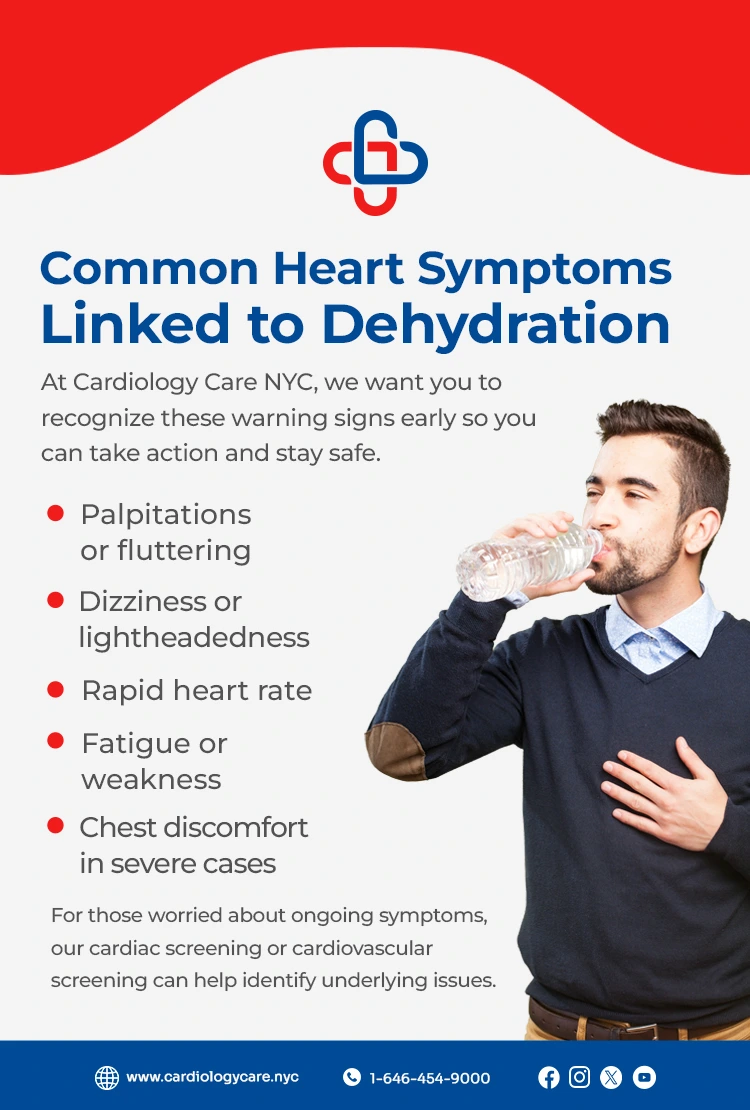You know staying hydrated is important, but did you realize dehydration can actually stress your heart?
Even mild dehydration can affect your blood pressure, heart rate, and cardiovascular function. This post explains how dehydration can lead to heart issues, the symptoms to watch for, and practical tips to keep your heart healthy and hydrated.
Table of contents
Can Dehydration Cause Heart Issues?
Yes, dehydration can strain your heart by reducing blood volume and making it work harder. Electrolyte imbalances can also disrupt your heartbeat. Older adults and those with heart conditions are especially at risk.
At Cardiology Care NYC, we often see patients with questions about how hydration affects their hearts. Our team wants you to understand these connections clearly.
If you’re concerned about these risks, consider our cardiology consultation service to discuss your symptoms and history.
How Dehydration Affects Your Heart?
Dehydration changes how your heart works in surprising ways. Before we get into the specific effects, here’s what you should know:
- Reduced blood volume forces the heart to pump faster.
- Electrolyte loss can trigger palpitations or arrhythmias.
- Low blood volume may lower BP too much or cause a compensatory high heart rate.
We may recommend tests like a holter monitor or an electrocardiogram (ECG) test if you’re experiencing palpitations or abnormal heart rhythms.
Common Heart Symptoms Linked to Dehydration
At Cardiology Care NYC, we want you to recognize these warning signs early so you can take action and stay safe.
-
- Palpitations or fluttering
- Dizziness or lightheadedness
- Rapid heart rate
- Fatigue or weakness
- Chest discomfort in severe cases
For those worried about ongoing symptoms, our cardiac screening or cardiovascular screening can help identify underlying issues.
Dehydration and Blood Pressure
Dehydration can have a real impact on your blood pressure. It’s not always straightforward, and understanding this link is important if you have heart concerns or manage hypertension.
Here’s what to know:
- Blood pressure can drop (orthostatic hypotension).
- Stress hormones may cause spikes in blood pressure.
- Elderly and those with hypertension are more vulnerable.
Checking your blood pressure screening test regularly is a smart way to manage these risks, especially if you have hypertension.
Dehydration vs Heart Condition
It’s not always easy to tell if your symptoms are just from being dehydrated or a sign of a more serious heart issue.
See a doctor if you have:
- Chest pain
- Ongoing palpitations
- Severe dizziness or confusion
- Signs of heatstroke
How to Stay Hydrated for Heart Health?
Staying well-hydrated is one of the easiest ways to support your heart. These simple tips can help you keep fluid levels in check and reduce strain on your cardiovascular system:
- Aim for 8+ cups of water daily.
- Watch for early signs like thirst or dark urine.
- Replenish electrolytes after sweating or illness.
- Seniors should be mindful of thirst cues.
Conclusion
Dehydration can put stress on your heart. Stay aware of your fluid intake, watch for symptoms, and seek medical care if you’re unsure. If you’re experiencing palpitations, dizziness, or unexplained fatigue, check your hydration—but don’t hesitate to talk to your doctor about your heart health. At Cardiology Care NYC, we’re here to help you with expert heart care in New York City.
Frequently Asked Questions
Can drinking too much water harm my heart?
Yes, overhydration can lead to low sodium levels (hyponatremia), which may affect heart rhythm and overall health.
Is caffeine dehydrating enough to impact heart health?
Moderate caffeine intake usually doesn’t cause significant dehydration, but very high amounts might increase heart rate or cause palpitations.
Does alcohol make dehydration-related heart issues worse?
Alcohol is a diuretic and can increase fluid loss, raising the risk of dehydration effects on heart rate and blood pressure.
Can certain medications increase dehydration risk?
Yes, diuretics and some blood pressure medications can lead to fluid loss, making hydration especially important for heart patients.
How does hot weather in NYC affect hydration needs?
NYC summers can increase sweat loss. It’s essential to drink more water to prevent dehydration, especially during heat waves.
Source
- Health Line – Is There a Connection Between Dehydration and Heart Palpitations?
- Heart Research Institute – Hydration and your heart
- Oklahoma Heart Hospital – How Dehydration Can Impact Heart Rhythms
- University of Maryland School of Medicine – Staying Hydrated When You Have Heart Failure
- Health Central – What Dehydration Does to Your Heart
Disclaimer
This blog is for informational & educational purposes only and does not intend to substitute any professional medical advice or consultation. For any health-related concerns, please consult with your physician, or call 911.

